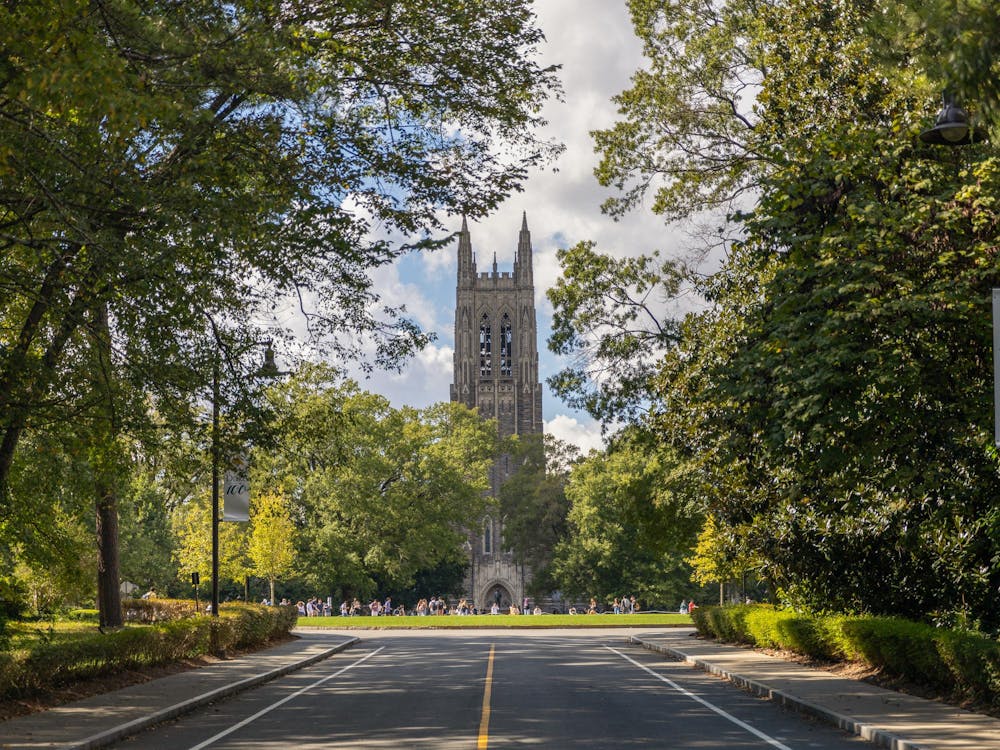As of Monday, 114 of Duke’s 4,109 faculty members had signed a petition advocating for the University to adopt an official policy of institutional neutrality and implement additional freedom of speech safeguards.
The petition, created by Duke Faculty for Institutional Neutrality and Free Speech, calls on the University to refrain from issuing position statements on current events that do not directly affect the institution’s “academic mission.” Exceptions would only be made in rare instances when the issue “directly concerns” the University’s mission.
“Unless higher administration actually intends to use its authority explicitly to advance one agenda over others, there is no reason for it to refuse institutional neutrality and discourage open debate and exchange of ideas,” wrote Professor of Biology Kathleen Donohue in an Oct. 24 email to The Chronicle.
The petition also notes that the University should not suppress “non-disruptive protests” on the basis that opinions being expressed by community members are considered “offensive, unwise, immoral or wrong-headed” by others.
Duke administration did not respond to The Chronicle’s request for comment on whether the University is planning to adopt a stance of institutional neutrality. It has yet to publicly respond to the petition.
The group assembled as other top universities pledged to implement institutional neutrality policies, following an uptick in student activism and political polarization on college campuses following the Oct. 7 attack on southern Israel by Hamas militants.
According to The Chronicle’s inaugural faculty survey, over 60% of faculty respondents across diverse fields and schools expressed their support for Duke to officially adopt a policy of institutional neutrality. However, liberal, female and Black respondents were less likely to support such a stance.
Prior to the formation of the group at Duke, some faculty suggested that Duke “follow other universities” in adopting institutional neutrality. The Academic Council recently established a committee tasked with reviewing the University’s practices regarding academic freedom and suggesting revisions to the existing policy.
Many of Duke’s peer institutions, including Harvard University, Northwestern University, Stanford University and the University of Pennsylvania have adopted institutional neutrality. Others, such as Yale University and Columbia University, have announced that they are considering adopting the policy.
Opinions of faculty in support of neutrality
The concept of institutional neutrality was born in the University of Chicago’s 1967 Kalven Report, created after student protests related to the Vietnam War roiled college campuses in the 1960s. The document recommended that universities adhere to their mission instead of “playing the role of a second-rate political force or influence,” and concluded by calling for “a heavy presumption against the university taking collective action or expressing opinions on the political and social issues of the day.”
For Donohue, official statements made by University leadership do not “reflect the position of the entire community at that institution.” She added that those who share a different point of view — or even those who agree, but have different opinions on how to address the issue — are “marginalized.”
Thomas Pfau, Alice Mary Baldwin professor of English and one of the petition’s original signatories, echoed Donohue’s views, noting his belief that universities should keep their educational roles and political views separate.
“Institutional neutrality would, in a way, exercise as a restraint on university administrators to not confuse their job with their personal views,” he said.
Pfau also spoke of the “disadvantage” incurred when an institution like Duke “tries to hammer out a particular view and opinion on contested issues” in a polarizing political climate. By weighing in on public debates, he believes the University attracts “as much adverse publicity as positive.”
Peter Arcidiacono, William Henry Glasson distinguished professor of economics and one of the petition’s original signatories believes that institutional neutrality would “actually [protect] the University” from the difficulties of trying to “please everybody.” He referenced how multiple university administrations’ public statements and remarks in the wake of the Oct. 7 attack drew intense backlash and outrage across the nation.
“When an institution declares ‘case closed,’ dialogue and learning are prevented,” Donahue wrote. “It is always useful to hear dissenting arguments and to diligently study those you disagree with; that is what sharpens your own reasoning.”
Though, Donohue added that one possible reason that universities across the nation have been slow to implement institutional neutrality is that faculty who agree with the policy are reluctant to voice their support because they “felt that it may put them at risk” professionally.
Freedom of speech on campus
Arcidiacono explained that the free speech principles are intended to allow students space to form and express their own opinions. He believes that students are still “trying to figure out what [they] believe,” and a campus culture that implies certain beliefs are wrong creates an environment where students are instead “figuring out what they will be punished for.”
Get The Chronicle straight to your inbox
Sign up for our weekly newsletter. Cancel at any time.
The protection of freedom of speech extends to faculty, according to Pfau. He pointed out that faculty members may currently refrain from taking perspectives “running counter to the official, institutional point of view” because doing so “might jeopardize their career.”
In September, Duke tightened its rules on student protests in its updated Pickets, Protests and Demonstrations policy, which prohibits disruptive picketing, protesting or demonstrating on Duke property. Those who engage in such conduct are subject to disciplinary action.
Arcidiacono said he wants Duke to be a place focused on “pursuing the truth” and “winning people over through argument rather than through fear.”
“We want people to feel comfortable exploring ideas, or at least expand the scope of what ideas can be explored,” he said.
Lucas Lin is a Trinity sophomore and a university news editor of The Chronicle's 120th volume.

